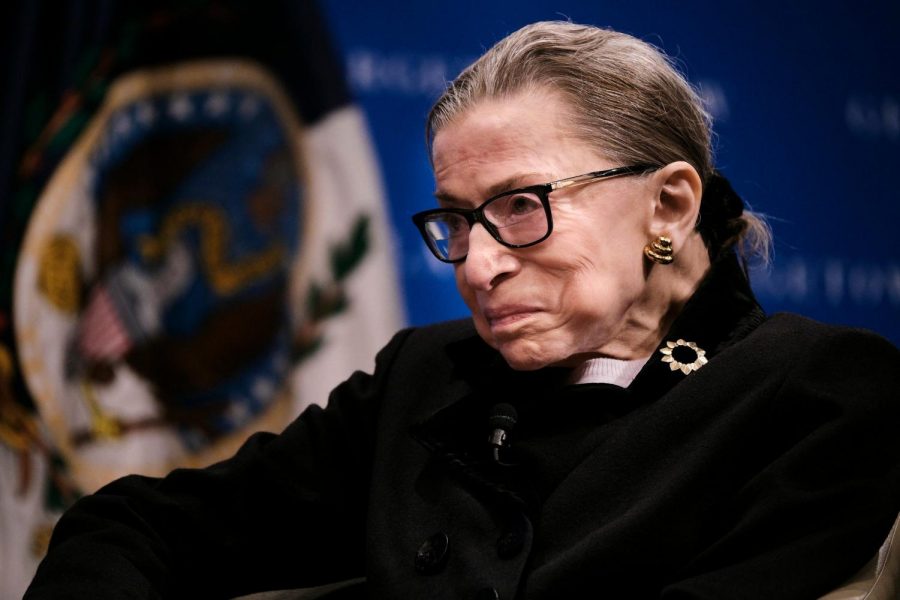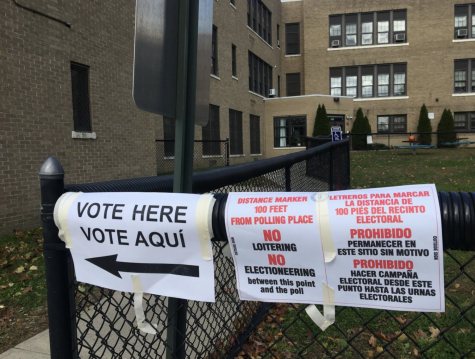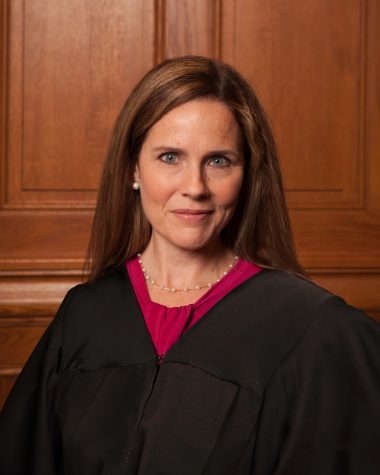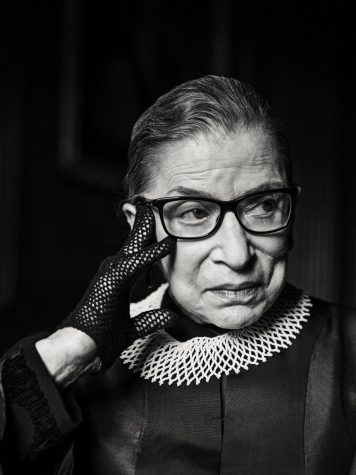Remembering an Icon– Ruth Bader Ginsburg’s Legacy
September 30, 2020
The Supreme Court robes were built for men. They are a uniform black, with pleats built into the seams. There is a distinct gap at the top of the robe where a tie would usually go, and upon this realization, Ruth Bader Ginsburg, the second woman ever to be appointed to the Supreme Court, decided to wear collars instead. Ginsburg decided to take something specifically designed for men and feminize it, making her wardrobe choices an act of resistance.
This small act of defiance, making a frilly lace collar her rebellion, encapsulates what people found so captivating about Ruth Bader Ginsburg. Appointed in 1993 by President Bill Clinton, many feared Ginsburg would favor moderacy, as she had voiced concerns regarding a woman’s right to choose and indigenous rights. Those fears were quickly put to rest, for in her 27 year tenure in the court, RBG possessed a quiet subversiveness that exuded her altered judge robe and reinforced her continual support of women and minorities.
Her consistent activism began when she, quite literally, wrote the textbook on sex discrimination law in 1974. Affectionately called “the notorious RBG” by her supporters, Ginsburg achieved the level of political liberal celebrity that politicians like Ed Markey, Alexandria Orcasio Cortez, and Bernie Sanders have seen recently. Her likeness is on mugs, socks, and t-shirts, all proclaiming her greatness and cementing her place in popular culture.
Through the end of her career, RBG fought her way through two types of cancer, all while working 80 hours a week. In September of 2020, she succumbed to complications of metastatic pancreatic cancer, at the age of 87. Although she was incredibly active in the fight for women’s rights, including the right for women to have a bank account in their own name, it is important to be objective and realistic about a politician’s beliefs. Ginsburg was not supportive of indigenous rights, and she voted against native sovereignty. However, being realistic also includes understanding and accepting the limits of your heroes. Expecting a woman born to the first generation of women who were able to have a home and job to be the most intersectional judge is simply not realistic. She was, and still is, a historic champion for justice and women’s rights, despite these imperfections. These two truths can coexist.
Now, in the wake of her death, there is an empty seat that the Trump administration is eager to fill. A Supreme Court seat, although each justice is intended to be neutral, allows a president to assert their platform for decades to come, as the seat is filled for life. The rush to fill a seat would seem contradictory, as President Obama was barred from appointing a judge in the last year of his second term. Nonetheless, the republican controlled senate is currently speeding through the process so that Trump’s appointee, Amy Coney Barret, can be approved before the election in November.
Barrett, an anti-LGBTQ, anti-immigrant, anti-choice, judge from Chicago allowes her Catholic faith to penetrate her governance. Many republicans, including Mitch Mconell, are hoping the new judge will serve one distinct purpose – to serve as the final vote needed to overturn Roe v. Wade. In 1973, the court’s historic ruling on Roe v. Wade established that the US constitution fundamentally protects a woman’s right to choose. Roe v. Wade has come under re-examination in recent years, with conservatives pushing to overturn the case and eliminate the protections it established.
Based on Barretts previous rulings, its safe to say that she would be in favor of changing the national abortion laws. Barrett has stated,“I think the question of whether people can get very late-term abortions, you know, how many restrictions can be put on clinics, I think that would change.”
While ceremonies commemorating the life of Justice Ginsburg were held in the capital, these past weeks should have been about the life that she led, her path to political greatness, and her wishes for the future. But because of the decay of judicial modesty and humility that has become increasingly obvious in our current political climate, we, as a collective, were immediately catapulted into the race to fill her seat rather than mourning and reflecting on such a meaningful life. May her memory be a blessing, and may her legacy be a testament to the power of hard work.
Disclaimer: This article pulls upon coverage from The New York Times, Business Insider, and ABC news.













